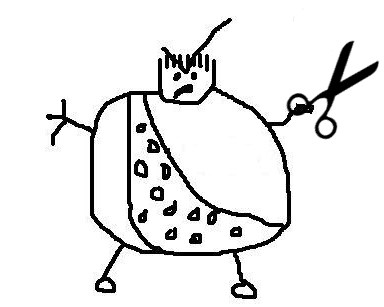
Let’s define our terms — scissors refers to a common cutting device that the ancient Egyptians purportedly used. Runs with scissors is a modern expression meaning impetuous, rash. (Build walking talking robots? Sure. Artificial life? We’re working on it. Clone a sheep? Resurrect a mammoth? Frack Oklahoma? Colonize Mars?) The Human Tide is that great splash of settlement and migration that has reached most points on the globe. There are still chinks but we’re not done.
We inherited stone tools and fire from our hominid ancestors so humans walked into the world going at a fair clip already. We added art, advanced language, music, ornament, bread, cloth, shoes. We domesticated other animals, we farmed, built cities, developed ceramics, metallurgy, folklore, laws, priests, commerce. Most metaphors of human advances have us climbing uphill, toiling up mountains, questing, winning. Heroes.
Switch that metaphor to human figures walking downhill — and gaining momentum. The momentum’s the thing. Our nature is to think and try and invent and build and to keep on going — because what else are we going to do? We’re human.
But we’d already picked up those scissors. Steam engines, electricity, mass communications. Maybe the atomic bomb was our first running stride with scissors, but we’ve already got momentum, how can we stop?
That’s where we are now. We accelerate at bullet speeds in every shard of science — how can we slow down? It’s too interesting to slam on the brakes and stop. Stop? Brakes?
And there are lots of good arguments about commerce and greed and corruption too. They’re secondary. We really can’t stop because we can’t stop.
Atomic energy has been the exception. We saw it in action in Japan, we discovered radiation in the food chain, we talked. Talks lead to treaties. It’s a start.
Our traditional categories of humans, beasts and plants have begun sprouting branches. Robots, sentient robots, cyborgs (meat and mech), artificial life. Humans with bionic enhancements will become as normal as heart patients with pacemakers. The disabled will walk away from their wheelchairs in exoskeletons and you won’t think twice about it. Jobs will be lost to mechanisms, as Big Brother flexes his muscles around the globe and Stephen Hawking thinks smart robots will grind us under their steel-mesh heels.
Do you discuss these things at dinner parties? Have you thought about a plan of action? Science has started messing with the human genome, playing chess with patches of DNA — it’s already been done in China. They have excuses. So it doesn’t really count, right?
_________________________
A small but hopeful sign is that public opinion has convinced even Ringling Bros. Circus to free their elephants from a drudgery of performing tricks. Public opinion. You and me sitting down and asking new questions. Reasoning. Or our herd consensus could shift to, “Let’s not stampede. Let’s munch.” So humans, let’s start talking. We’re all we’ve got.
Here’s a partial list of conversation starters, none of which is overused. Try one with your friends, the guy next to you on the subway or if you win dinner with the President.
- • Are cyborgs (part meat part machine) human? What if they started out human? What if they’re made in a lab but now have emotions, attachments?
- • How would you rank the rights of cyborgs v. rights of robots with AI v. rights of old-fashioned humans?
- • Can sentient robots be owned? But you paid to have it made!
- • Can robots inherit property? Vote? Be arrested?
- • What bionic enhancement would you take a risk to acquire? Night vision – a diva’s singing voice – bone-crushing arms?
- • Will those people who can’t stop hating be adding these new kinds of beings to their blacklists? (This is such a no-brainer that we can’t even give you points for it.)
- • Should Science alter human embryos? If you’d really really all your life wanted a blue-eyed child? If tinkering could save a baby from a crippling disease?
Lastly, for the sake of frivolity, ponder the future of wearables. “Ladies and gentlemen will you please turn off your phones and luminous garments.” / “Table for two? Blinking or non-blinking?”
